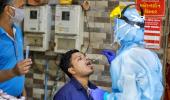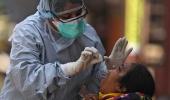'Unless we make our own testing kits, we will not get out of this disease faster.'

"The earlier you identify the person, you can isolate him faster. So, it is not only good for the patient, but for the population also. When an asymptomatic patient walks around, s/he spreads the virus," Dr Anoop Thekkuveettil, senior scientist in the division of molecular medicine at the Sree Chitra Thirunal Institute of Medical Sciences and Technology in Thiruvanathapuram, tells Shobha Warrier/Rediff.com in the second segment of a three-part interview.
You and your team developed the testing kit Chitra Gene Lamp-N first, and now Chitra Magna. What is the difference between the two?
They are not two different things; just two parts of a kit.
In COVID-19 detection, you need RNA isolation because this is an RNA virus. Only if you isolate the RNA can you convert it to the DNA.
After that you need to amplify it either in a lab or in a PCR (polymerase chain reaction, which is a method widely used in molecular biology to make millions of copies of a specific DNA sample).
We do lab LAMP (loop-mediated isothermal amplification) reaction of the DNA, and that's why our testing kit is called Chitra Lamp-N.
Chitra Magna is mainly to isolate the RNA, and it is part of Chitra Lamp-N.
Right now, all the RNA isolation kits, rather 99% of them, are coming from abroad. Because we do not have any good high-quality RNA isolation kit, we decided to develop it.
In fact, it is mainly for the LAMP reaction that we developed it.
Then we found that even those doing PCR also suffer from lack of RNA isolation kits. That's when we thought why can we not give Chitra Magna to them so that they can isolate the RNA through their PCR.
Though Chitra Magna is essential for our testing, PCR people also can use it. That's when we decided to split the testing into two; for us and also for PCR.
Chitra LAMP reaction is a new kind of chemistry which is an alternate to RT- PCR. Reverse transcription polymerase chain reaction, or RT-PCR, is the current technology that is used by everyone to detect COVID-19.
But RT-PCR is a very expensive machine costing around Rs 50 lakhs to Rs 1 crore and operating the machine also requires very high expertise. That's why it is done only in medical colleges and research institutes. Moreover, there are only very few machines available in the country.
We felt we needed a smaller, simple system which can be used, for example, in a district hospital so that we can test faster and at a cheaper rate. And we get almost equivalent PCR results.
How fast is your result?
Usually in a PCR from the sample to result takes about 6 to 8 hours, but in our machine you get the results in less than 2 hours.
 Chitra Lamp N, left, is faster and it is the size of a laptop only. So, you don't require a very high-end machine. And even normal technicians can run this machine.
Chitra Lamp N, left, is faster and it is the size of a laptop only. So, you don't require a very high-end machine. And even normal technicians can run this machine.
From the swab, we isolate the RNA using Chitra Magna and then test for the virus.
Your hospital press release says Chitra Magna has an advantage in RNA extraction...
The advantage Chitra Magna has in RNA extraction is, we can extract a very highly concentrated RNA.
On the other hand, the other kits used currently give only a very diluted RNA.
When the RNA is fresh it works everywhere, but the problem in India is that the testing centres are far away. So, samples have to be transported to the testing centres.
You are supposed to transport the samples in a very low temperature, which is -20 degree centigrade.
What happens if the temperature rises?
In high temperatures the RNA will get spoilt, and you will get a negative result even if the person is positive. This problem can only be solved by maintaining the cold chain, which is very difficult in India.
We thought if we could increase the amount of RNA, even if some of the RNAs get spoiled we would have a few good ones left. That's where Chitra Magna has an advantage as it extracts a very high concentrated RNA.
The second advantage is, it is very easy to do the extraction. You don't need any equipment; you only need a small magnet and can isolate the RNA.
The best kits are made in Germany, but they are not selling them now as they also need them. So, they will not sell us till the disease is over there.
What India suffers from right now is lack of good testing kits. What we get are from China, Korea, etc.
And the testing kits that came from China are said to be defective and ICMR is sending them back to China.
Yes. We have no choice right now. Since we do not have any testing kits in our country, we have to buy from somewhere.
As the good quality kits are bought by other countries, we are only left with these Chinese kits.
Unless we make our own testing kits, we will not get out of this disease faster.

Will you be able to make it in bulk so that it is available all over the country?
We plan to make the testing kit Chitra Lamp-N together with Chitra Magna, and also Chitra Magna alone, available in the market.
We have given the technology to a company in Kochi and they are making it in bulk.
We also plan to give it to three more companies so that more kits are available in the market. We will be signing an MoU with one of the biggest companies in the country very soon.
Is it because the genetic information specific to the coronavirus is in the RNA that the extraction of RNA is very important in detecting the virus?
Yes. Only by testing the RNA can you recognise whether it is COVID-19 or not. That's because every virus has a particular signature gene.
Is there any advantage for the patient in testing the RNA?
Yes, the advantage of testing the gene is that you can pick up the presence of the virus in the patient even on day one.
The earlier you identify the person, you can isolate him faster.
So, it is not only good for the patient, but for the population also. When an asymptomatic patient walks around, s/he spreads the virus.
The problem with the antibodies test is that it takes 7 days to show the antibodies in the blood. By the time s/he would have infected many people. That is why ICMR has now withdrawn many antibodies testing kits.










